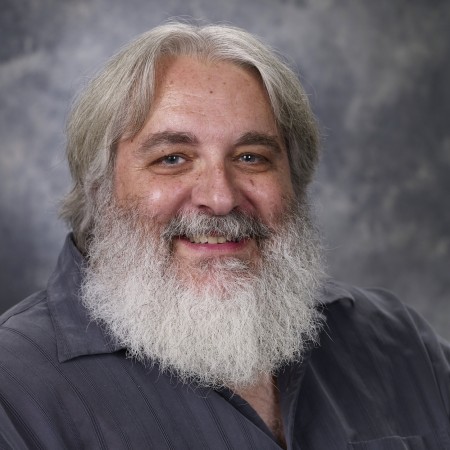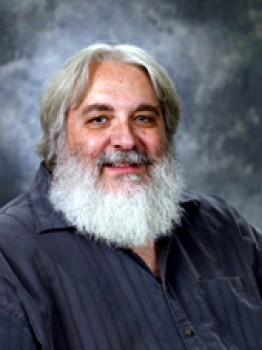
Lucien Thompson
Research Interests: Aging, with an emphasis on learning and memory, neuronal excitability, loss and recovery of function, and nootropic (memory-enhancing) drugs
Aging & Memory Research Laboratory
Curriculum Vitae
ORCID
Not currently accepting undergraduate or graduate students
Professional Preparation
Northwestern University - 1989
University of Virginia - 1988
California State University, San Bernardino, California - 1983
California State College - 1981
Research Areas
Research Interests
As a cellular- and systems-level neuroscientist, I strive to understand and improve the basic cellular mechanisms of learning and memory. I have concentrated my research efforts on regulation of post-synaptic excitability, more specifically, the necessary role of Ca2+-dependent K+ channels.
These K+ channels play a crucial role in memory-related plasticity across the lifespan. They interact strongly with NMDA (NR) excitatory glutamate receptors to regulate excitability in Hebbian models, and bridge important gaps in multiple forms of meta-plasticity critical for memory consolidation. Our work shows that plasticity of these K+ channels is highly conserved: across different species, different tasks, and across brain regions (i.e. they are a necessary convergence point in learning and in memory consolidation).
Our learning and memory research incorporates both chronic in vivo and acute in vitro neurophysiological recordings, coupled with molecular/neurochemical assays, as well as a wide range of behavioral approaches. Recent investigations have assessed the effects of channel-specific antagonists, of anti-oxidants, stress, and emotion, and have manipulated or assessed cellular mechanisms in experience- and aging-dependent neuropathologies including tinnitus and diabetes. Our data clearly demonstrate adaptive shifts in cognitive and neurobiological strategies for storing and accessing memories as the brain ages, yielding new potential nootropic targets for functional improvement (i.e. better memory).
Publications
Awards
Appointments
The University of Texas at Dallas [2000–Present]
The University of Texas at Dallas [1997–Present]
Northwestern University Medical School [1992–1997]
Northwestern University Medical School [1989–1991]
Northwestern University Medical School [1988–1989]
University of Virginia, Charlottesville, VA [1986–1988]
University of Virginia, Charlottesville, VA [1983–1986]
University of Virginia, Charlottesville, VA [1983–1985]
California State University, San Bernardino, California [1981–1983]
Department of Neuroscience [2020–2021]
First year of new Department
Projects
Hippocampal neurons act as place cells
2002–2002 Neuroscience brownbag talk, Oct. 4.Anticholinesterase treatment in aging: Behavioral and neurophysiological effects.
2001–2001 Neuroscience brownbag talk, Nov. 30.Hippocampal cellular correlates of learning
2002–2002 Neuroscience brownbag talk, Mar. 29.Non-synaptic neural plasticity in learning and aging.
2001–2001 Neurobiology seminar, School of Life Sciences, UT San Antonio, June 29.Hippocampal cellular correlates of learning.
2003–2003 Neuroscience lecture, Dept. of Psychiatry, VA Medical Center, Dallas, TX, Feb. 7.Additional Information
Editorial
2001 - Behavioral NeuroscienceAwards and Honors
- 1972 Eagle Scout
- 1981 Presidential Fellow, California State College. Academic excellence award.
- 1982 Elected member of Psi Chi, Honor Society for Psychology.
- 1983 Student Research Fellowship, Biofeedback Society of America.
- 1983 Presidential Fellow, University of Virginia. Academic excellence award.
- 1984-1986 President, Neuroscience ]ournal Club, University of Virginia.
Reviewer for
Grant Applications:
- Alzheimer's Association (1998 - )
- Cognitive Functional Neuroscience Review Committee, Special Emphasis Panels, NIMH, (1998 -)
- Developmental Neuroscience Panel, NIH (1995 - 1998)
- Loan Repayment Program, NIH (2006 - )
Journals:
- Nature (1993- )
- Journal of Neuroscience (1994 - )
- Neurobiology of Aging (1995 - )
- Brain Research (1995 - )
- Journal of Neurophysiology (1996 - )
- Behavioral Neuroscience (1997 - )
- Journal of Pharmacology & Experimental Therapeutics (1997 - )
- Hippocampus (1997 - )
- Trends in Neuroscience (1998 - )
- Trends in Pharmacological Sciences (1998 - )
- Behavioral Pharmacology (2005 - )
- Neuroscience Letters (2006 - )
- European Journal of Neuroscience (2006 - )
News Articles
Research Widens Study of Brain's Role in Tinnitus
 UT Dallas neuroscientists are examining whether multiple areas of the brain are culpable in causing tinnitus, research that could enable new medical interventions against the disabling effects of severe “ringing in the ears.” Dr. Tres Thompson, associate professor in UT Dallas’ School of Behavioral and Brain Sciences, found that exposure to loud noises induces plasticity in the hippocampus, a section of the brain not primarily associated with hearing but known for learning-related plasticity. This neuroplasticity – changes in the function of the brain in reaction to experiences – could open the door to long-term tinnitus, he said. A three-year, $135,000 grant from the American Tinnitus Association supports this work in Thompson’s lab. The next stage of research will focus on drug treatments aimed at reducing or reversing plasticity. Thompson wants to test whether certain drugs targeting plasticity mechanisms might inhibit or change plasticity, protecting against tinnitus.
UT Dallas neuroscientists are examining whether multiple areas of the brain are culpable in causing tinnitus, research that could enable new medical interventions against the disabling effects of severe “ringing in the ears.” Dr. Tres Thompson, associate professor in UT Dallas’ School of Behavioral and Brain Sciences, found that exposure to loud noises induces plasticity in the hippocampus, a section of the brain not primarily associated with hearing but known for learning-related plasticity. This neuroplasticity – changes in the function of the brain in reaction to experiences – could open the door to long-term tinnitus, he said. A three-year, $135,000 grant from the American Tinnitus Association supports this work in Thompson’s lab. The next stage of research will focus on drug treatments aimed at reducing or reversing plasticity. Thompson wants to test whether certain drugs targeting plasticity mechanisms might inhibit or change plasticity, protecting against tinnitus.